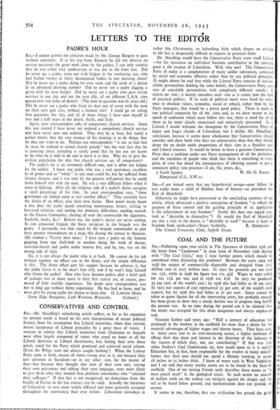CONSERVATIVES AND CONTROL SIR, —Mr. Maudling's stimulating article suffers, so far
as his argument on present needs is based on his own interpretation of recent political history, from his assumption that Liberal majorities, when they existed, meant acceptance of Liberal principles by a great mass of voters. I venture to submit that Liberal majorities from Gladstone. to Asquith were often largely composed of voters who cared no hoots at all for Liberal doctrines or Liberal doctrinaires, but, feeling their own shoes pinch, voted for the Party which promised and achieved social reform. (Even the Whigs were not always caught bathing!) When the Labour Party came to birth, masses of voters swung over to it, not because they saw salvation in Socialism—or in any other -ism, for the matter of that—but because they thought that men of their own sort, voicing their own grievances and talking their own language, were more likely to give them what they wanted than platform somebodies who " solicited their suffrages." If that fact is not recognised, no deductions from the history of Parties in the last century can be valid. Actually the doctrines of Liberalism -re now more widely diffused and more generally accepted throughout the community than ever before. Liberalism nowadays is
rather like Christianity, an indwelling faith which shapes an attitude to life but is desperately difficult to express in practical form.
Mr. Maudling would have the Conservative Party avow itself Liberal —for his insistence on individual freedom contributive to the common good is the essence of Liberalism. Well, why not? The Conservative Party of today is a conglomerate of many unlike substances, cemented by social and economic affinities rather than by any political principles. (It might almost be said that while the Liberal Party consists of irrecon- cilable personalities holding the same beliefs, the Conservative Party con- sists of concilable personalities with completely different creeds.) It rejects no -ism ; it merely considers each -ism as it comes into the field of practical politics. If its scale of political merit were fixed by refer- ence to absolute values, economic, social or ethical, rather than by the Party managers, that would be a pretty good policy. There is room in our political composite for all the -isms and, as we .draw nearer to the epoch of confusion which must follow this war; there is need for all of them to be more clearly enunciated and attractively presented. As a Liberal I would welcome the absorption by the Conservative Party of larger and larger chunks of Liberalism, but I dislike Mr. Maudling's conclusion, because it seems more wholesome that Conservatives should consider and show forth why they are conservative than that they should drape the no doubt noble proportions of their -ism in a Socialist coat and Liberal trousers. It would be better to have a genuine Conservative Party than a coalition under one Party management of all the prejudices and the timidities of people who think that there is something in every point of view but dread the consequences of allowing anyone to put a consistent policy into practice.—I am, Sir, yours, &c.,


























 Previous page
Previous page